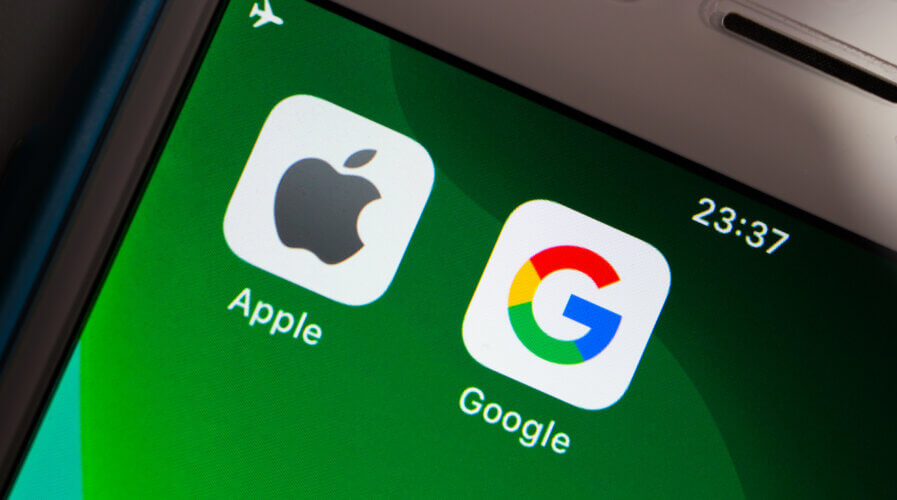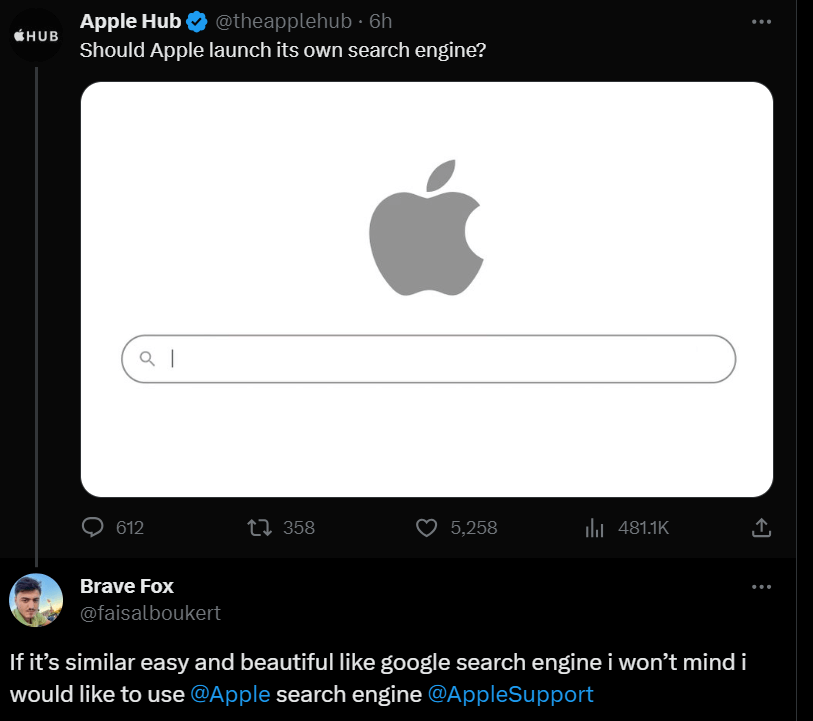
Apple’s journey toward search engine superiority. (Shutterstock)
Can Google keep its ‘best search engine’ title as Apple evolves?
- Despite Google’s “best search engine” status, Apple’s Pegasus and internal search enhancements are making headway.
- Apple’s dive into search tech and its bid for more ad revenue challenge Google’s reign.
- An apple search engine is the missing piece of its internet puzzle.
Apple is ready to expand its wealth in a world where information is a currency. The tech titan’s anticipated expansion of its powerful internal search engine into the App Store and various other applications marks a significant stride in enhancing user-centric, seamless search experiences – as highlighted by Mark Gurman in the recent Power On newsletter for Bloomberg.
With the launch of iOS 14 and iPadOS 14, Apple unveiled enhancements to its Spotlight search feature, which lets users search for web results, app details, documents, and a plethora of other content more effectively than before.
Heading the large search team at Apple is John Giannandrea, a former Google executive now in charge of machine learning and AI at Apple.
Over the last few years, his team has meticulously developed a next-generation search engine for Apple’s applications, called Pegasus. This cutting-edge technology, acclaimed for its precision in bringing results to the surface, has already found its place in certain Apple apps. It is set to be integrated into more, including the App Store.
Spotlight: A glimpse into Apple’s best search engine efforts
The pinnacle of Apple’s search endeavors is conspicuously reflected in Spotlight, a tool designed to help users find various items across their devices. A few versions back in iOS and macOS, Apple began to incorporate web search results into this tool, directing users seamlessly to websites likely to provide answers to their queries. Over different intervals, these results were driven by either Microsoft Corp.’s Bing or Alphabet Inc.’s Google, technologies also utilized by Siri to produce web results.
Giannandrea and his team are steadfast in their mission to further embed Apple’s search functionalities into the iOS and macOS ecosystem, possibly enhancing the technology with innovative, generative AI tools.
Apple is also fortified by its advertising technology division, a valuable asset should the company’s search aspirations expand. This team efficiently manages the search ad operations in the App Store, delivers advertisements to Apple News and other apps, and is responsible for brokering advertising deals for streaming sports. The team has the skills and personnel to lay a solid foundation for a potential web search advertising group.
Apple Inc. has been contemplating the creation of a search engine robust enough to dethrone Google on its devices for a long while.

An X user on the use of Google’s search engine with Apple’s potential search tool. (Source – X)
The reasoning is straightforward: search tools are ubiquitously utilized on smartphones, tablets, and computers, and Apple has consistently aimed to monopolize the core technologies integral to its products. With billions of dollars in the balance, Apple currently receives a portion of Google’s search ad revenue, translating to approximately US$8 billion annually in recent times. The financial allure of retaining a larger share of this revenue is palpable.
If Apple succeeds in deploying its proprietary search engine, it has the potential to generate revenue comparable to the proceeds from the Apple Watch, presuming advertising and search slots could be sold at prices analogous to Google’s. Despite the seemingly remote likelihood of that happening, the revenue prospects of an in-house search engine are substantial, even if they don’t entirely rival Google’s.
Apple’s continuous exploration into search technology is rooted in this understanding. Even without direct competition with Google, the advancements in non-web search capabilities and the leverage in pricing negotiations with Google represent significant gains.
Challenging Google’s dominance
Despite Google’s dominance in search, the tech giant remains reliant on Apple and its extensive user base. The prevailing agreement incentivizes Apple to guide its users towards Google. The enhanced promotion of Google search translates to increased revenue for Apple.
Gurman underscores that while Apple’s Spotlight and app search engine may not measure up to Google’s prowess, a robust App Store ads business and other facets equips Apple with sufficient components to debut its search engine, potentially soon.
The technology is central to Spotlight, and app searches may be limited compared to Google’s capabilities. However, it lays the foundational framework for Apple to unveil a comprehensive search engine.

Apple’s Spotlight and app searches may be limited compared to Google’s capabilities. (Source – Shutterstock)
The advent of AI affords Apple a prospective edge. The company’s machine learning division actively recruits engineers specializing in search technologies. Furthermore, acquisitions like Laserlike in 2019, an AI-centric search engine established by former Google employees, bolster Apple’s groundwork for a prospective search engine.
The question of Apple embarking on this journey remains. As reported by The Verge, Apple executive Eddy Cue has previously asserted the company’s lack of necessity for its search engine, even reportedly declining an offer to acquire Bing in 2020, a decision Cue firmly stood by.
During an inquiry with the Apple executive, a lawyer for Google, John Schmidtlein, led Cue through Safari’s evolution, with Cue emphasizing the integral role of the search box and URL bar to the browser’s functionality, made possible by Google’s partnership.
Cue also delivered a quintessential Apple viewpoint: the endorsement of Google as the paramount search engine is aligned with global customer expectations, solidifying Google’s esteemed position.
Ultimately, Google may stay on top until – or unless – Apple unveils a better option. With its vast ecosystem, including the App Store, Apple already stands as a strong Google rival. The only piece missing is an Apple search engine, which could be closer to launch than expected.
READ MORE
- Safer Automation: How Sophic and Firmus Succeeded in Malaysia with MDEC’s Support
- Privilege granted, not gained: Intelligent authorization for enhanced infrastructure productivity
- Low-Code produces the Proof-of-Possibilities
- New Wearables Enable Staff to Work Faster and Safer
- Experts weigh in on Oracle’s departure from adland






